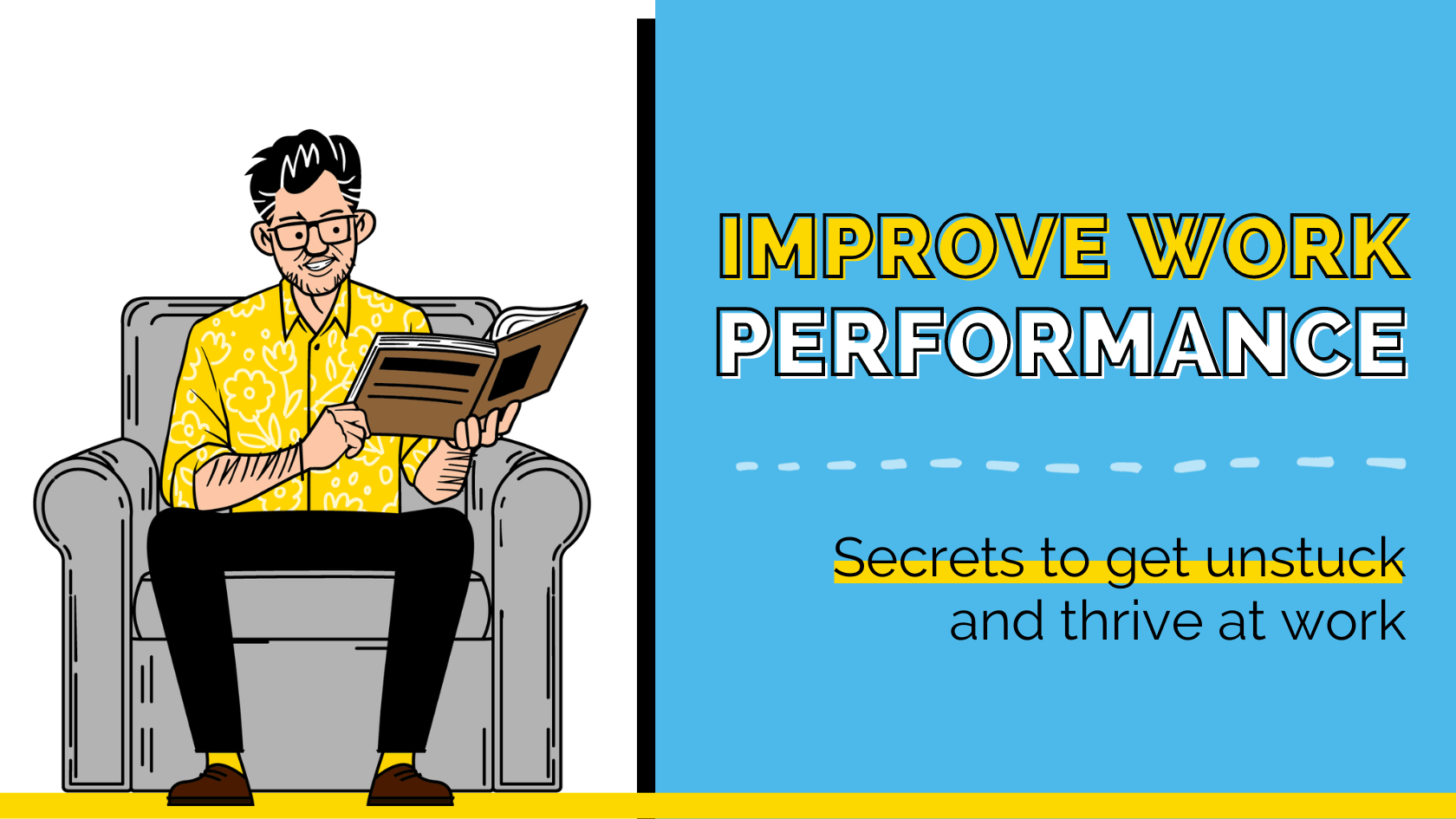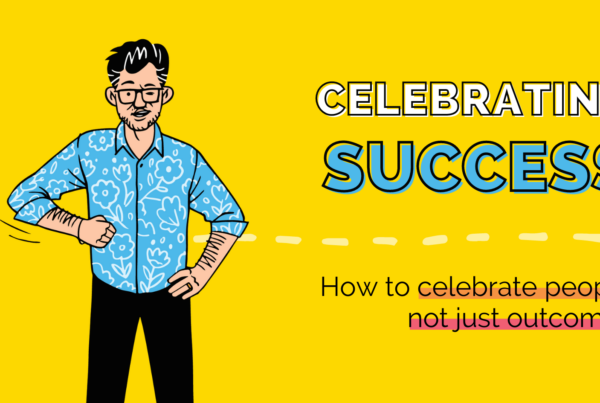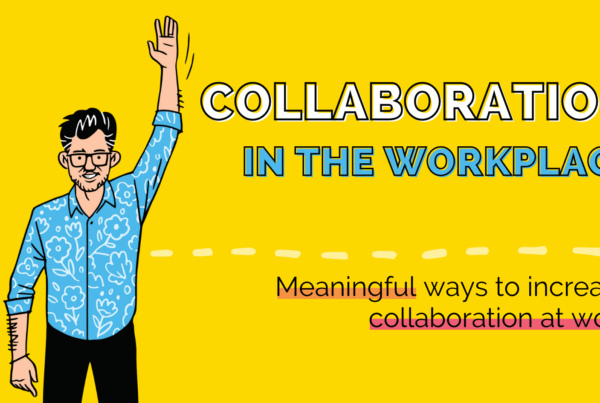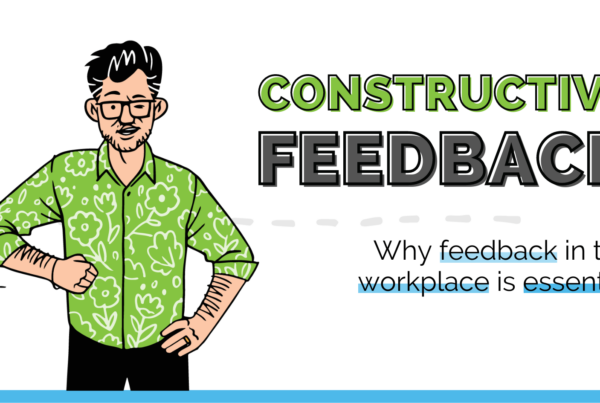
I remember this moment clearly. I was sitting in a cubicle. Beige. One of the fluorescent light tubes was buzz-humming. There was a weird stain on the ceiling tile, a stain that seemed to mirror the weird stain on the carpet tile directly beneath it.
And I was editing the sixth draft of a too-long Powerpoint document that I was pretty sure no-one was interested in.
And I thought to myself … this is my one and precious life.
What am I doing?
Maybe you’ve had a similar moment, a momentary flash of insight about some piece of pointless work you’re doing.
It’s Bad Work.
Bad Work is a time drain. It’s pointless bureaucracy. It’s treading water.
It’s mind-numbing. Soul-sucking. Life-draining.
If you want to improve your work performance and thrive, you need to get unstuck from doing Bad Work day in, day out.
What’s the remedy for this? Spending more time doing Good Work and, ultimately, Great Work.
Michael, I hear you say, what do these all these capitalized words mean?
Good question. Let me break it down below.
The Greatest Answers Come From the Greatest Questions
Become a better leader. Better teacher. Better person.
Learn how to ask the right questions the right way with this free download.
Eight Ways to Ask a Question Well
Good Work and Great Work: The Secrets to Improving Your Work Performance
If you’ve read Do More Great Work, you’ll know I talk about Good Work and Great Work a fair amount.
Good Work is the familiar, useful, productive work you do and do well. Good Work is how you spend a lot of your time, and there’s nothing wrong with it. This work blossoms from your training, your education, the path you’ve traveled so far – all in all, it’s a source of comfort, nourishment, and success.
At an organizational level, Good Work is vital. It is a company’s bread and butter, the efficient, focused, profitable work that delivers next quarter’s returns.
But if you want to really improve your work performance, you want to do more Great Work. This is the work that drives strategic difference, innovation, and longevity. Often, it’s the kind of creative, risk-taking work that pushes business forward, and leads to new products, more efficient systems, and increased profits.
And on a personal level, Great Work inspires, stretches, and provokes you. Great Work is the work that matters, gives to the world more than it takes, makes you feel human and connected and purposeful.
How do we do more great work? Using the following methods:
10 Tips to Improve Your Work Performance
Alright, we know what all the uppercase Work words mean. Now let’s dive into the meat of this article – how to carve out more time for Good and Great Work, and stay away from mind-numbing Bad Work.
1. Talk Less, Ask More
As early as our school days, we’re taught and rewarded for knowing the answers – and it’s something we tend to carry into the workplace. We think the best way to show our expertise and proficiency is to jump in with our opinions, ideas, suggestions, and advice.
But, actually, when you rush in to fix things for people, you’re training them to come to you for advice. And this is a bad thing for two reasons. First, it leaves you feeling overwhelmed and drowning in work, making it harder to bring your best.
Second, it stops your colleagues from becoming more confident, more competent, more capable, and more able to work by themselves.
The antidote? Improve your coaching skills by slowing down the rush to provide a solution to every problem and getting curious instead.
By asking one or two powerful questions, you’re going to help your people come up with better answers, and you’re going to work less hard while having more impact.
Of course, the questions you ask will depend on the context. Say your CEO has a request but your team’s already overloaded with work. You could say: “What do we need to say no to so that we can say yes to this?”
Similarly, if you’re struggling to get to grips with what your client actually wants, you can gain clarity and reengineer everyone’s focus by asking, “What’s the real challenge we’re trying to solve here?”
2. Learn to Say No (And Be Strategic About It)
Daniel Kahneman, Nobel Prize winner and author of Thinking Fast and Slow, said that “the best idea I ever heard in psychology” was that change is often best created by releasing the brake rather than pressing harder on the accelerator.
And this leads me to one of the deep truths about doing more Great Work – deciding what to say yes to, and what to say no to.
Despite our tendency to think that doing more and saying yes to more will lead to better performance, often, saying no to commitments, ideas, and people creates the capacity and energy to focus on the stuff that matters.
Now, I get that saying no can be hard, especially if it’s to colleagues in the workplace. But think of your goal not as saying no but as saying yes more slowly.
Part of what trips us up is how our default is set to saying yes and saying yes quickly. If you can just slow things down a little, get curious, and ask questions about what’s being asked of you, then you’ll end up not committing yourself to so much.
3. Establish How to Work Before You Begin
Harvard Business Review research shows that people in friendship-friendly workplaces are more successful, more productive, and more connected than the average employee.
And yet, 99% of the time, people jump into projects with their colleagues, partners, and clients without really getting to grips with the human across the table.
If you want to communicate better and boost your work performance, then it’s time to change that – and that’s where the Keystone Conversation comes in.
As I explore in How to Work With (Almost) Anyone, the Keystone Conversation is a sitdown discussion between you and another person where you chat through your and their working habits, preferences, and how to bring out the best in each other.
The Keystone Conversation has nothing to do with what you’re working on and everything to do with how you’re going to work together and collaborate in the workplace.
I recommend framing the discussion based on a few open questions. Here’s some to get you started:
- What’s your best?
- What are your practices and preferences?
- What have you learned from past relationships?
- How will you fix it when things go wrong?
4. Nurture I/Thou Relationships
Continuing along the theme of building working relationships, it’s vital to realize that, to work at your best, you need to get the best out of the people around you.
One of the easiest, simplest ways to do this is to think about how you engage with others: moving away from I/it relationships and embodying the mindset of I/thou relationships, as made famous by Martin Buber.
In an I/it relationship, you see your co-workers as an object. They’re a cog in a larger machine. Your focus is solely on productivity, efficiency, and metrics, and you lose your sense of the other person’s humanity.
An I/thou relationship is when you remember just who this person is. You see them in their full humanity and feel all the empathy, vulnerability, and compassion that comes with that.
By connecting to their humanity, you help them connect to yours, and that’s where innovation, creativity, and Great Work happen.
5. Take Feedback Onboard (Even If It Hurts)
Did you know that we’re hardwired to feel threatened when receiving feedback? Yep, from a neurological perspective, the words “let me give you some feedback” hit the same pain circuits as if we were physically hit.
But the thing is, even though it’s scary, feedback is actually a wonderful gift. Within the other person’s words are probably some very useful nuggets of wisdom that can help you improve your work performance.
So, next time someone offers up feedback to you, remember these three things to make the interaction a little more valuable and a little less frightening:
- Remember it’s feedback for you not about you. Not only do you not have to take it personally, you don’t have to take it at all if you don’t want to.
- Assume positive intent. A lot of the time, people are trying to be helpful and they’re trying to make you and what you’re doing better. Treat them as allies, not opponents.
- Remember feedback is rarely the truth, but mostly just an opinion. Sometimes it’s helpful to figure out the facts the opinion is based upon. But in the end, take what’s useful, and ignore the rest.
6. Find Focus
You are what you give your attention to. To do your best work, you need to give the task at hand 100% focus. That means no multitasking.
Now, you might be thinking: “I can multitask. I do it all the time and I seem to be doing okay.”
But get this – the people who multitask the most are the worst at multitasking. It’s one of the few things in the world that you get worse the more you do. Why? Because it takes you so long to recover, re-engage, and begin the next task.
Of course, relying on willpower alone to resist multitasking is nearly impossible. Instead, I recommend manipulating your environment to make it easy for you to find focus.
So, before you sit down to do some good or Great Work, think about the following things:
- How will you arrange your environment so that you are not distracted?
- What will you put away?
- How will you remove yourself from the pathway of people stopping to talk to you and hide yourself in a corner?
The idea is to design your environment to eliminate distractions and encourage focus, so your willpower muscle has to work a little less hard.
7. Delegate With Integrity
Delegation can be a wonderful tool to empower your team members, help them grow, and enable you to focus on high-value work.
What delegation shouldn’t be is a dump and run. You know what I mean – you’re busy. You’re stressed. You hand over some tasks to your team, and then you disappear to fight the fires you’ve been delegated.
It’s a haphazard way of lightening your load and piling problems on to someone else. Sure, it helps at the moment, but it will harm your working relationships and reputation in the long run.
On the flip side, practicing delegation with integrity involves infusing intentionality into the process.
When you delegate with integrity, you’re essentially saying to the person you’re entrusting a task to: “I believe in your capabilities for this task; here’s why. These are my expectations, the timeline, and here’s how I’ll support you.”
This form of delegation is powerful because it recognizes the human behind the task. You acknowledge their strengths, weaknesses, drives, and motivations, and you help them – and you – do more Great Work.
8. Find Your Balance Between Good and Great Work
The right mix between Good Work and Great Work is different from year to year, person to person. To check if you’ve got the balance right for you, I recommend this simple exercise.
Draw a circle and divide it into three segments that represent how much Bad, Good, and Great Work you have going on right now. Take your best guess.
Now, sit and ask yourself: do I have the right mix of Good Work and Great Work?
See what it tells you. See if you’re happy with what it tells you.
If you’re content, then great! But if you feel like you need to take more control of your life, start using projectization. I’m a big fan of projects because they have a clear start, a clear finish and a way of measuring success.
So, looking at your to-do list and what’s on the horizon, pick something to work on that will be your Great Work project, and go for it.
9. Fail Fantastically
Great work, for all its wondrous benefits, takes us to a place of uncertainty and discomfort. The discomfort arises because the work is new and challenging and as a result, there’s an element of risk and possible failure.
Because this is work that matters, work that you care about, you don’t want it to fail. And because it’s new and challenging, there’s a chance that it might.
I want you to understand that it’s both okay and inevitable to fail. In fact, wisdom enters through the wound. Within every failure, there’ll be some valuable learnings that make you better and stronger.
One way to bounce back from failure is to mimic the US military’s after-action review.
After every mission, they club together and ask a series of questions:
- What was supposed to happen… what did happen… and why the gap?”
- “What worked… and what didn’t work?”
- “What would you do differently next time?”
It’s a way of viewing failure through the lens of a growth mindset, creating space for reflection so you grow from every experience.
I think Beckett said it best: “Try again. Fail again. Fail better.”
10. Set a Worthy Goal
As you welcome more Great Work into your life, I’ll bet you start to feel a pull. You sense the stirrings of your own ambition. You know that you have more to contribute. You want to think bigger and make a difference. You want to learn and grow.
That means it’s time to set a worthy goal. As I outline in How To Begin, a worthy goal has
three intertwined attributes. It needs to be:
- Thrilling – it needs to light you up and get you excited.
- Important – it balances what you want and what your organization demands.
- Daunting – it needs to help you grow, learn, expand, and become the next best version of you.
Now, working on a worthy goal while doing enough Good Work can be hard, but it will also help you amp up your value among the seniors in your organization because you’ll showcase yourself as a big-picture thinker – someone who’s smart about the stuff that matters.
To help you balance everything, I suggest you look at your portfolio of obligations and ask:
- Which might I choose to amp up?
- Which has the potential of being a worthy goal for me?
- How do I move something to make it more central, more important, and more thrilling, and more daunting for me?
Are You Ready to Redefine What Success Looks Like?
Ultimately, improving your work performance isn’t just about working harder, coloring within the lines, and hitting arbitrary metrics. To really make a difference, create more impact, and find meaning in the work you do, you need to get clear on what matters to you.
Be courageous. Be bold. And start working on stuff that truly matters.
Ready to begin?
Then grab a copy of my book, How To Begin, or perhaps, Do More Great Work.




